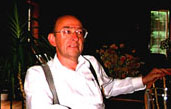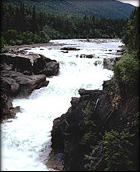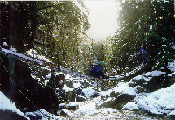| [ Main Menu ] | |
|
|
|
 |
|
|
|
|
|
|
|
|
An interesting technique for exposing dominant thought, methodologies and prevalent paradigms is through the use of strategic questioning. Strategic questions, as defined by Peavey (1994) are questions that make a difference. They facilitate motion from stuck positions, create options and liberate creativity, dig deep exposing roots, avoid asking "why" or creating defensiveness, avoid single questions that can be answered with only "yes" or "no", empower versus manipulate, ask the unaskable and question assumptions, and they support expressions of our essence, our higher values and can therefore facilitate positive co-evolution. Using a series of strategic questions, this dialogue is examining the following root definition as a point of departure. The implementation of sustainable development is the social imperative of this and the next decade, requiring strong leadership by local, regional and national governments. A common framework across governments is critical to their being able to provide consistent and effective leadership to other sectors of Canadian society, in order to diffuse its concepts and practices in the next decade, before irreversible thresholds are reached. The particular research methodology being used is a combination of soft systems methodology (SSM) and participatory action research methods. The former is a non-numerical soft systems approach (Checkland 1981, Checkland and Scholes 1990, Davies and Ledington 1991) that recognizes there will always be many possible versions of the system to be engineered or improved and system boundaries and objectives may well be impossible to define. The basic principle is to formulate some models that are relevant to the real-world situation, and use them by setting them against perceptions of the real world in a process of comparison. Inherent to soft systems methodology are the concepts of "Weltanschauung" or worldview and holon. Meaning is attributed to human activity and attributions are meaningful in terms of a particular image of the world, which, in general is taken for granted. The methodology teases out such world-images and examines their implications (Checkland 1981). The systems paradigm is An action researcher has some vision of how society or organizations could be improved and uses the research process to help bring this desired future state into existence. This is based on the premise that knowledge without action is meaningless (Elden and Chisholm 1993). Action research employs an epistemological egalitarianism in method that aims for participant learning and meta learning, not just the solution to a scientific and practical problem. It is essentially a co-generative learning process (Elden and Levin 1991). Trist (1976) pushes the concept of action research further by arguing that action research needs to be extended to include planning and planning to include action research. He sees planning as a collaborative undertaking between social actors and social scientists to achieve an active adaptation to complexity, interdependence, and uncertainty, these being the conditions that most characterize the emerging world environment. The particular variant of action research being used in this electronic dialogue is a form of co-operative inquiry (Heron 1988; Rowan 1976), in which all those involved in the research are co-researchers, whose thinking and judgment contribute to generating ideas and drawing ideas from the experience, and also co-subjects, participating in the activity being researched. This method transcends the researcher-researched dualism. The particular form being used is action inquiry, which is concerned with the transformation of organizations and communities into collaborative, self-reflective communities of inquiry. Developed by Torbert (1981, 1987, 1991), it attempts to develop a consciousness in which action and reflection interpenetrate. The process of action inquiry positions the practitioner right in the contradiction between deep engagement, participation and commitment to the moment, and simultaneous reflection, standing back and self-awareness (Reason 1994).
[To see the entire collection of emails that make up the dialogue, click here.] |
|
|
|
|
|
|
|
| [back to top] |
 This electronic dialogue started in September 1996 as part of the doctoral work of Ann Dale, studying with Dr. Stuart Hill, in the faculty of Natural Resource Sciences, McGill University. In addition to her advisor, Stuart Hill, who is now Foundation Chair, School of Social Ecology at the University of Western Hawkesbury at Sydney, her committee members include Valerie Behan-Pelletier, Scientist, Agriculture Canada; John Henning, Faculty of Agricultural Economics; Macdonald Campus, McGill University; David Johnston, Faculty for Medicine, Ethics and Law, McGill University; Jim MacNeill, Chair, International Institute for Sustainable Development Research and Frances Westley, Faculty of Management, McGill University.
This electronic dialogue started in September 1996 as part of the doctoral work of Ann Dale, studying with Dr. Stuart Hill, in the faculty of Natural Resource Sciences, McGill University. In addition to her advisor, Stuart Hill, who is now Foundation Chair, School of Social Ecology at the University of Western Hawkesbury at Sydney, her committee members include Valerie Behan-Pelletier, Scientist, Agriculture Canada; John Henning, Faculty of Agricultural Economics; Macdonald Campus, McGill University; David Johnston, Faculty for Medicine, Ethics and Law, McGill University; Jim MacNeill, Chair, International Institute for Sustainable Development Research and Frances Westley, Faculty of Management, McGill University. concerned with wholes and their properties, indeed, the research methodology itself is seen as a holon. SSM is concerned with both the natural and human spheres, and it is the interaction between the two that is of interest.
concerned with wholes and their properties, indeed, the research methodology itself is seen as a holon. SSM is concerned with both the natural and human spheres, and it is the interaction between the two that is of interest. The interview technique has been replaced by an electronic dialogue that allows for synergy among the participants, connectivity across areas of expertise and experiences, as well as for emergent knowledge and solutions. Since qualitative researchers are less concerned with the size of their sample, and more with pursuing an issue or question until they understand it, a diversity of stakeholders from professional networks across Canada have been brought together on the basis of Ann Dale's experience of working in sustainable development over the past 10 years. Although not a random sampling, it is an intensity sampling, where one selects participants who experiential experts and authorities about a particular experience (Morse 1994). The co-researchers are composed of academics who in the majority of cases are also practitioners, activists, researchers in quasi-government organizations and senior policy analysts from the provincial and federal governments. The dialogue is expected to last for a period of two years, and may, depending on its emergent properties, continue on past that point.
The interview technique has been replaced by an electronic dialogue that allows for synergy among the participants, connectivity across areas of expertise and experiences, as well as for emergent knowledge and solutions. Since qualitative researchers are less concerned with the size of their sample, and more with pursuing an issue or question until they understand it, a diversity of stakeholders from professional networks across Canada have been brought together on the basis of Ann Dale's experience of working in sustainable development over the past 10 years. Although not a random sampling, it is an intensity sampling, where one selects participants who experiential experts and authorities about a particular experience (Morse 1994). The co-researchers are composed of academics who in the majority of cases are also practitioners, activists, researchers in quasi-government organizations and senior policy analysts from the provincial and federal governments. The dialogue is expected to last for a period of two years, and may, depending on its emergent properties, continue on past that point.